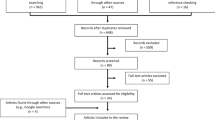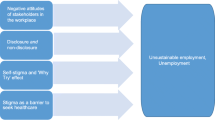Abstract
Objectives
To assess the relationship between paid work, family characteristics and health status in Central American workers; and to examine whether patterns of association differ by gender and informal or formal employment.
Methods
Cross-sectional study of 8680 non-agricultural workers, based on the First Central American Survey of Working Conditions and Health (2011). Main explicative variables were paid working hours, marital status, caring for children, and caring for people with functional diversity or ill. Using Poisson regression models, adjusted prevalence ratios of poor self-perceived and mental health were calculated by sex and social security coverage (proxy of informal employment).
Results
A clear pattern of association was observed for women in informal employment who were previously married, had care responsibilities, long working hours, or part-time work for both self-perceived and mental health. No other patterns were found.
Conclusions
Our results show health inequalities related to unpaid care work and paid work that depend on the interaction between gender and informal employment. To reduce these inequalities suitable policies should consider both the labor (increasing social security coverage) and domestic spheres (co-responsibility of care).
Similar content being viewed by others
References
Arcas MM, Novoa AM, Artazcoz L (2013) Gender inequalities in the association between demands of family and domestic life and health in Spanish workers. Eur J Public Health 23:883–888. doi:10.1093/eurpub/cks095
Ariza M, De Olivera O (2004) Familias, pobreza y necesidades de políticas públicas en México y Centroamérica. In: Arriagada I, Aranda V (eds) Cambio de las familias en el marco de las transformaciones globales: necesidad de políticas públicas eficaces. ECLAC, Santiago de Chile, pp 153–195
Arriagada I (2009) La diversidad y desigualdad de las familias latinoamericanas. Rev Latinoam en Estud Fam 1:9–21
Artazcoz L, Borrell C, Benach J (2001) Gender inequalities in health among workers: the relation with family demands. J Epidemiol Community Health 55:639–647
Artazcoz L, Artieda L, Borrell C, Borrell C, Cortès I, Benach J, García V (2004) Combining job and family demands and being healthy: what are the differences between men and women? Eur J Public Health 14:43–48. doi:10.1093/eurpub/14.1.43
Artazcoz L, Cortès I, Escribà-Agüir V, Cascant L, Villegas R (2009) Understanding the relationship of long working hours with health status and health-related behaviours. J Epidemiol Community Health 63:521–527. doi:10.1136/jech.2008.082123
Artazcoz L, Cortès I, Escribà-Agüir V, Bartoll X, Basart H, Borrell C (2013) Long working hours and health status among employees in Europe: between-country differences. Scand J Work Environ Health 39:369–378. doi:10.5271/sjweh.3333
Artazcoz L, Cortès I, Puig-Barrachina V, Benavides FG, Escribà-Agüir V, Borrell C (2014) Combining employment and family in Europe: the role of family policies in health. Eur J Public Health 24:649–655. doi:10.1093/eurpub/ckt170
Bartoll X, Cortès I, Artazcoz L (2014) Full- and part-time work: gender and welfare-type differences in European working conditions, job satisfaction, health status, and psychosocial issues. Scand J Work Environ Health 40:370–379. doi:10.5271/sjweh.3429
Batthyány K, Genta N, Perrotta V (2015) El aporte de las familias y las mujeres al cuidado no remunerado de la salud en el Uruguay. ECLAC, Santiago de Chile
Benavides FG, Wesseling C, Delclos GL, Felknor S, Pinilla J, Rodrigo F (2014) Working conditions and health in Central America: a survey of 12,024 workers in six countries. Occup Environ Med 71:459–465. doi:10.1136/oemed-2013-101908
Benería L (2001) Shifting the risk: new employment patterns, informalization, and women’s work. Int J Polit Cult Soc 15:27–53
Benería L (2008) The crisis of care, international migration, and public policy. Fem Econ 14:1–21. doi:10.1080/13545700802081984
Buvinic M, Giuffrida A, Glassman A (2002) Gender inequality in health and work: the case of Latin America and the Caribbean. Inter-American Development Bank, Washington DC
Carr M, Chen M (2004) Globalization, social exclusion and gender. Int Labour Rev 143:129–160. doi:10.1111/j.1564-913X.2004.tb00548.x
Cassirer N, Addati L (2007) Expanding women’s employment opportunities: informal economy workers and the need for childcare. ILO, Geneva
Fagan C, Norman H, Smith M, González Menéndez MC (2014) In search of good quality part-time employment. ILO, Geneva
García-Calvente M, Mateo-Rodríguez I, Maroto-Navarro G (2004) El impacto de cuidar en la salud y la calidad de vida de las mujeres. Gac Sanit 18:83–92
Giatti L, Barreto SM, Comini César C (2008a) Household context and self-rated health: the effect of unemployment and informal work. J Epidemiol Community Health 62:1079–1085. doi:10.1136/jech.2007.069740
Giatti L, Barreto SM, Comini César C (2008b) Informal work, unemployment and health in Brazilian metropolitan areas, 1998 and 2003. Cad Saude Publica 24:2396–2406. doi:10.1590/S0102-311X2008001000020
Goldberg D, Gater R, Sartorius N et al (1997) The validity of two versions of the GHQ in the WHO study of mental illness in general health care. Psychol Med 27:191–197. doi:10.1017/S0033291796004242
Günther I, Launov A (2012) Informal employment in developing countries. Opportunity or last resort? J Dev Econ 97:88–98. doi:10.1016/j.jdeveco.2011.01.001
ILO (2010) Decent work for domestic workers. In: International labour conference, 99th Session. ILO, Geneva
ILO (2011) 2011 labour overview. Latin America and the Caribbean. ILO, Lima
ILO (2013) Measuring informality: a statistical manual on the informal sector and informal employment. ILO, Geneva
Jütting J, Parlevliet J, Xenogiani T (2008) Informal employment re-loaded. IDS Bull 39:28–36. doi:10.1111/j.1759-5436.2008.tb00442.x
Lexartza Artza L (2012) La organización social de los cuidados en Centroamérica y la República Dominicana. Barreras para el acceso de las mujeres al mercado laboral. ILO, San José
López Bóo F, Madrigal L, Pagés C (2010) Part-time work, gender and job satisfaction: evidence from a developing country. J Dev Stud 46:1543–1571. doi:10.1080/00220388.2010.492864
López-Ruiz M, Artazcoz L, Martinez JM, Rojas M, Benavides FG (2015) Informal employment and health status in Central America. BMC Public Health 15:698. doi:10.1186/s12889-015-2030-9
Ludermir AB, Lewis G (2003) Informal work and common mental disorders. Soc Psychiatry Psychiatr Epidemiol 38:485–489. doi:10.1007/s00127-003-0658-8
Ludermir AB, Lewis G (2005) Is there a gender difference on the association between informal work and common mental disorders? Soc Psychiatry Psychiatr Epidemiol 40:622–624. doi:10.1007/s00127-005-0938-6
Lund F, Srinivas S (2000) Learning from experience: a gendered approach to social protection for workers in the informal economy. ILO, Geneva
Marmot M, Friel S, Bell R, Houweling TAJ, Taylor S (2008) Closing the gap in a generation: health equity through action on the social determinants of health. Lancet 372:1661–1669. doi:10.1016/S0140-6736(08)61690-6
Menéndez M, Benach J, Muntaner C, Amable M, O’Campo P (2007) Is precarious employment more damaging to women’s health than men’s? Soc Sci Med 64:776–781. doi:10.1016/j.socscimed.2006.10.035
Patston P (2007) Constructive functional diversity: a new paradigm beyond disability and impairment. Disabil Rehabil 29:1625–1633. doi:10.1080/09638280701618778
Rodríguez Enríquez C (2007) Economía del cuidado, equidad de género y nuevo orden económico internacional. In: Giron A, Correa E (eds) Del Sur hacia el Norte: Economía política del orden económico internacional emergente. CLACSO, Buenos Aires, pp 229–240
Sales EC, Santana VS (2003) Depressive and anxiety symptoms among housemaids. Am J Ind Med 44:685–691
Santana VS, Loomis D, Newman B, Harlow SD (1997) Informal jobs: another occupational hazard for women’s mental health? Int J Epidemiol 26:1236–1242. doi:10.1093/ije/26.6.1236
Sauma P (2003) La Situación del empleo en el istmo centroamericano: informalidad, precariedad laboral, crecimiento económico y pobreza. In: Sojo A (ed) Pobreza y vulnerabilidad social: mercado de trabajo e inversión social en el Istmo Centroamericano a inicios del milenio. ECLAC, México, pp 28–74
Acknowledgments
We acknowledge Edurne Jiménez and George L. Delclòs for their review of the manuscript.
Author information
Authors and Affiliations
Corresponding author
Ethics declarations
Conflict of interest
The authors declare that they have no conflict of interest.
Ethical approval
All procedures performed in this study were in accordance with the ethical standards of the Parc de Salut MAR Ethical Committee and with the 1964 Helsinki declaration and its later amendments or comparable ethical standards.
Informed consent
Informed consent was obtained from all individual participants included in the survey.
Additional information
This article is part of the special issue "Development and Public Health".
Rights and permissions
About this article
Cite this article
Lopez-Ruiz, M., Benavides, F.G., Vives, A. et al. Informal employment, unpaid care work, and health status in Spanish-speaking Central American countries: a gender-based approach. Int J Public Health 62, 209–218 (2017). https://doi.org/10.1007/s00038-016-0871-3
Received:
Revised:
Accepted:
Published:
Issue Date:
DOI: https://doi.org/10.1007/s00038-016-0871-3




